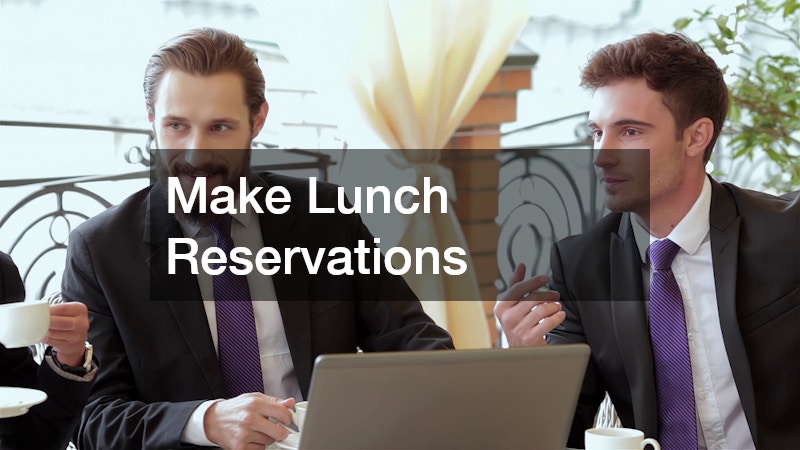When preparing for a significant business meeting, the attention to detail can determine success or failure. From the initial arrangements made prior to the meeting to the concluding follow-up tasks, every aspect plays a crucial role. In the modern business landscape, meetings often require participants to travel from various locations, necessitating detailed logistical planning. Coordinating such efforts can be complex and time-consuming but is essential for creating a professional and successful impression.
Planning isn’t just about booking a hotel or reserving a conference room. It involves a myriad of activities, including arranging flights, airport transportation, and lodging accommodations—often with special considerations to ensure the comfort and convenience of attendees. Moreover, tokens of appreciation like a thoughtful gift basket or items from local custom embroidery services can add a personal touch that helps foster goodwill. Every step taken before the actual meeting sets the stage for what follows, affecting the ease of interaction and even the results of tax planning discussions that might take place.
In this article, we lay out a comprehensive guide to prepare for a meeting, touching on every critical facet that needs addressing prior to your meeting. Whether it’s making lunch reservations at prime lunch restaurants or creating a strong sales pitch, each task contributes to laying down a successful meeting framework. Let’s delve into the specifics of these arrangements, ensuring your meeting is executed without a hitch.
Arrange Flights
One of the first tasks is organizing flights for attendees, ensuring all parties can arrive promptly. Selecting the airport is a pivotal decision, impacting convenience and logistics. Availability of flights, distance to the meeting location, and ease of airport transportation play significant roles in this choice. Aligning these factors seamlessly among all attendees is crucial for minimizing travel-related stress and allows them to focus on the meeting agenda upon arrival.
Furthermore, coordinating travel prior to the meeting is essential to accommodate any changes in schedules or unforeseen delays. This proactive approach helps avoid last-minute disruptions and enables travelers to have a smooth transition from their cities to the meeting venue. Additionally, working closely with limousine companies can ensure seamless transfers to and from the airport, enhancing the travel experience with comfort and luxury.
Technology plays a vital role in managing these arrangements efficiently. Utilizing booking platforms that offer updates on flight schedules and delays can ensure all stakeholders remain informed. This, coupled with real-time communication channels to manage changes as they arise, can mitigate risks associated with travel. Prior to the meeting, this diligent flight arrangement strategy sets a positive tone that can reflect on the meeting’s success.
Arrange Airport Transportation
After flights are confirmed, arranging airport transportation becomes the next priority. Choosing reliable limousine companies is often preferred for business travel, as they provide a sense of professionalism and ensure punctuality. A smooth transition from the airport to the hotel or meeting venue reduces stress and allows attendees more time to prepare for the agenda ahead.
Options for airport transportation must be considered in advance, as delays or miscommunications can disrupt carefully laid-out schedules. Having a trusted service means more than just convenience—it ensures peace of mind for attendees. In addition, selecting a service that accommodates any special requirements or requests will enhance the guest experience, reflecting positively on the meeting host.
It’s also important to communicate details about transportation arrangements clearly to all parties involved. Confirmations should include pickup times, contact numbers for drivers, and any relevant charges to prevent confusion. Prior to the meeting, double-checking these details ensures seamless coordination and reinforces a professional image for the event organizers.
Plan Their Lodging
Accommodations play a significant role in the preparation process, setting the scene for a comfortable stay. Choosing the right lodging option, such as reputable hotel chains or Airbnbs, can impact an attendee’s overall experience. Proximity to the meeting venue, onsite amenities, and the level of service should all be considered critically prior to the meeting.
A convenient and comfortable stay not only affects the mood and energy levels of participants but contributes to their satisfaction with the overall meeting setup. Checking on flexible cancellation policies and available accommodations that offer a home-like atmosphere can make all the difference. Prior to the meeting, these accommodations can be professionally secured, providing attendees with confidence and clarity in their travel arrangements.
Communicating lodging choices through formal or digital means is vital. Providing insightful details such as dining options, transportation routes to the meeting location, and local emergency contacts can significantly improve their stay experience. Addressing these details ahead of time ensures guests feel welcomed and valued, setting a positive tempo for the meeting itself.
Provide Gifts
Expressing gratitude through gifts is an endearing way to forge lasting business relationships. Curating a thoughtful gift basket with items sourced from local enterprises or branded with the aid of a local screen printing company can enhance the recipient’s experience. Prior to your meeting, consideration of the personal preferences of attendees would be advantageous in curating these gifts.
Incorporating custom fundraising swag or employing custom embroidery services can offer unique, personalized touches that recipients are sure to appreciate. These gifts function as enduring reminders of the meeting, offering a token of appreciation that reinforces the ties established. Make arrangements for these gifts well ahead of time, as ensuring proper timing and quality reflects on your commitment to potential clients or partners.
Choosing gifts also involves considering cultural sensitivities and appropriateness; thus, it’s beneficial to be informed about guests’ backgrounds. A carefully curated basket, delivered precisely prior to their arrival or during the meeting, speaks to your understanding and regard for the attendees. Ultimately, these gestures improve rapport and can positively affect meeting outcomes, helping bolster trust and cooperation.
Make Lunch Reservations
Breaking the meeting day with a well-planned lunch exemplifies hospitality and foresight. Therefore, securing reservations at lunch restaurants situated conveniently near the meeting venue is essential. This forethought not only demonstrates consideration for guest preferences but also respects their time by minimizing transit between locations.
When choosing lunch restaurants, consider those with swift service, diverse menu offerings, and accommodating settings conducive to informal discussions. This offers guests the opportunity to relax and recharge, facilitating productive conversations in a less formal environment. Prior to your meeting, confirming lunch reservations ensures smooth logistics and tailored arrangements to accommodate all dietary preferences.
Additionally, having a backup plan for these arrangements is prudent in case of unexpected changes or delays. Communicate restaurant selections and schedules with attendees to adjust any preferences or attendees’ needs. Taking these preliminary steps ensures that this break during the meeting day contributes positively to the overall experience, allowing both hosts and guests to be refreshed and prepared for follow-up discussions.
Have Your Documents Ready
Before diving into the main agenda, having all necessary documents organized is a cornerstone of meeting preparedness. This encompasses tax planning documents, relevant financial reports, and supportive data that may be crucial during discussions. Ensuring these are current and meticulously organized prior to your meeting reflects professionalism and readiness.
Documents must not only be precise but thoroughly understood by the primary host to effectively answer any queries during the meeting. Having both printed and digital versions readily accessible allows adaptability based on guest preferences. These preparations foster confidence and smooth dialogue when intricate details are dependent upon during exchanges.
Anticipating attendees’ concerns or questions about the documents and preparing appropriately detailed presentations or summaries is also intelligent. Engaging with a mindset open to addressing these needs shows forethought and respect for attendees’ time. In-depth preparations conclude with appropriate storage or sharing procedures, emphasizing data security and propriety that win attendees’ respect and trust.
Prepare an Agenda
One of the most significant preparatory aspects is the agenda, acting as the roadmap for the meeting. Crafting this document with clear time allocations and topics ensures a structured and focused session. Transparency in the agenda presented to attendees prior to the meeting defines expectations and emphasizes inclusivity in topic discussions.
It serves as a guide for keeping discussions on track, minimizing digressions, and ensuring comprehensive coverage of priorities. Including buffer time within the schedule provides flexibility for spontaneous yet pertinent topics that arise during the meeting. Negotiating the agenda among stakeholders beforehand reflects careful consideration and inclusive communication strategies.
An itinerary that reflects the objectives, timelines, and anticipated results can serve as a measure to assess the meeting’s success. Sharing this comprehensive plan confirms the meeting’s structure and content meet all expected deliverables. Through strategic agenda creation, meetings develop focus and clarity, ensuring valuable time is spent efficiently and productively.
Gather Your Team
In Assemble your core team, as these key individuals provide the necessary support and insight that can drive the meeting’s objectives. Assign roles and responsibilities clearly prior to the meeting to ensure each member is well-prepared and aligned with the goals. This ensures seamless collaboration and ability to address tasks efficiently.
Regular pre-meeting sessions with your team can strengthen communication and clarify any concerns, ensuring coherent group dynamics. This facilitates a better understanding of each member’s contribution to the meeting, highlighting how their expertise influences the outcome. By preparing your team well in advance, members present a unified front, positively impacting the meeting’s success.
Equip them with necessary resources, like access to agenda details or specific documents, ensuring everyone is prepared to contribute effectively. Anticipate potential challenges and role-play solutions with your team to enhance readiness. This practical approach supports the meeting process, fostering team coherence essential for successful engagement with attendees.
Create a Sales Pitch
Fine-tuning a sales pitch prior to your meeting significantly influences the effectiveness of your presentation. Understanding the audience’s priorities and aligning your pitch accordingly can increase the chances of meeting your objectives. Preparation allows for genuine engagement, showing that you have invested time to understand and address the counterpart’s needs.
Ensuring the pitch incorporates persuasive elements that highlight unique offerings, backed by credible data and testimonials, adds weight to your arguments. The venue for potential questions should reflect an understanding of attendee anxieties or hesitations, rewarding such patience with tailored solutions. This demonstrates high regard for their interests and a willingness to cooperate towards beneficial outcomes.
Practicing the sales pitch helps recognize areas needing improvement prior to your meeting. By focusing on clarity, brevity, and relevance to your audience, you communicate confidence and professionalism. An engaging pitch garners respect and nurturing trust, evolving the relationship towards constructive collaboration.
Understand Their Needs
Taking the time to thoroughly understand attendees’ needs prior to the meeting can shift the direction of discussions favorably. This understanding facilitates the crafting of tailored solutions that resonate with potential clients or partners. Demonstrating empathy and constructive approach signifies your appreciation for their perspectives, enhancing receptivity to discourse.
Researching your attendees’ industry, company, or prior interactions allows for meaningful contributions during discussions. It empowers you to offer relevant examples, emphasize mutual benefits, and propose action paths that align with their objectives. This proactive stance improves meeting quality and positions you as a knowledgeable and adaptable collaborator.
Employing active listening techniques as discussions evolve during the meeting enables nuanced comprehension of underlying concerns. Acknowledging these subtly, with consideration of what was prepared, serves to build affinity and confirms your investment in a successful partnership. Over the course of the meeting, these skills can foster genuine connections and a perceptible readiness to cater to their needs.
In conclusion, effective meeting preparation involves a series of strategic steps that must be addressed meticulously and pro-actively. From logistical arrangements, such as booking flights and securing transportation, to enhancing the guest experience with thoughtful gifts and accommodating lodging, each aspect must be handled with foresight. When every organizational piece is properly aligned prior to the meeting, it not only sets a professional tone but also significantly contributes to the seamless execution and success of the meeting itself.
Laying out a clear agenda, establishing rapport through unique gestures like custom fundraising swag, and practicing an impactful sales pitch are all crucial for achieving your goals. Planning ahead and preparing thoroughly mitigates potential issues, alleviates stress, and establishes a frame that supports effective communication and productive interactions. Furthermore, understanding your team’s and the attendees’ roles and expectations ensures that everyone contributes optimally to the desired outcomes.
Essentially, timely planning prior to your meeting ensures that participants feel valued and respected, resulting in increased satisfaction and a stronger impetus towards achieving shared objectives. This comprehensive approach to preparation not only enhances individual meetings but also creates a lasting, positive impression—fortifying long-term business relationships that drive success beyond the boardroom.





